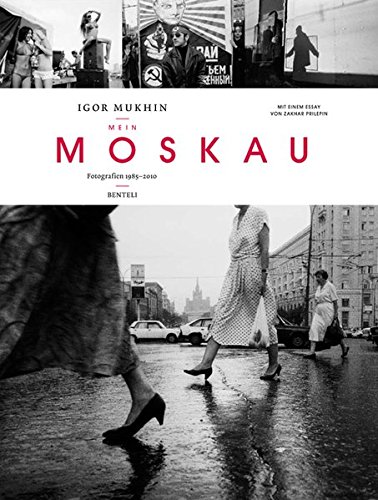Igor Mukhin „Mein Moskau“ – Photographs of everyday life in the Russian metropolis from 1985 until 2010
In: Russia TODAY May 6, 2013 online and in print version magazine Russia TODAY for the Frankfurt Book Fair October 2013. By Rosemarie Zens

Sometimes it takes a second glance. When I looked at the photo book „My Moscow“ by Igor Mukhin, published last year by the Swiss Benteli Verlag, I recognized some of his images. I had already seen them in the exhibition of contemporary Russian photography at the Houston Fotofest Biennial in 2012. There the artist was presented alongside Boris Mikhailov, Valera and Natasha Cherakshin and others as an important representative of a group of photographers of the “ Transition Period“. We are talking about the period when Soviet Russian society was beginning to open up after the liberalization of state censorship. It was also the same time when unregulated capitalist growth was shaping up, and a mass culture was emerging.
Igor Mukhin, born 1969 in Moscow, is a freelance photographer and lecturer at the Rodchenko School of Photography. Already the title of his book „My Moscow“ is part of the program: emotional participation and contemporary testimony. In over 200 b/w photographs, scenic details from everyday life in the Russian metropolis are shown. The mixture between press photography, images in an anecdotal style and film stills reflects the atmosphere and mood of the time, in which the individual tries to assert himself in the ups and downs of disparate social-political trends. Motif and composition complement each other, formally masterfully solved, working on different pictorial levels and close to classical street photography.
On closer examination, moreover, the permanent change of perspective in the selection and sequence of images in the book reveals discontinuities, traces of forgotten ideals, such as a greater autonomy of the individual. It is the relentlessly critical view of one’s own city, unvarnished: of the concrete housing silos next to the dwellings made of tarpaulins, from which a hand stretches out toward the viewer. Or the person who steps out of an open container, grasping a glass pane with both hands, barely visible himself, whose contours appear much larger in silhouette on the wall than in reality. On another picture you see five men who step out from a staggered stage construction like actors on stage, their faces looking into the void. And it just happens that one image shows a book by playwright Samuel Beckett displayed on the artist’s desk as a reference to the absurd, the meaninglessness, weariness, and hopelessness of it all.
In another photograph, serene faces of young women with wide-open tired eyes and either dismissive or salacious gestures find their complementary counterpart in the fearful gaze of a dog tied to a railing with a leash.
Far from serving “the Western cliché of Russian everyday life between booze and funeral“ (at the Berlin conference of the Academy of Arts „Wohin stürmst du Russland“ on April 20, 2013), the photographer stays close to the inhabitants of the city, takes them seriously, especially by also using irony andcriticism. He records their disorientation, the disorder and desolate conditions in times of omnipresent neoliberalism and civilizational regression. It is the portrait of a confused, lost generation, either passive or in sheer action in search of affiliation.
Yet, the powerful self-representation through pictorial composition and close-up views are such that they appear as a reflection of a consciousness that not only reacts to circumstances, but at the same time addresses the viewer to engage in generating forces for conversion and a new beginning.
In Houston, Igor Mukhin’s photographic work was credited with remarkable versatility and creativity. Certainly, the period 1985 – 2010 is very complex. On the way from the dissolution of the Soviet Union, glasnost and perestroika to Putin’s so-called controlled democracy, the phase characterized by optimism was replaced by disillusion. Since then, after an aesthetic of subversion, the path now being sought is one that leads inwards with metaphysical, religious, and often obscure themes. Nevertheless, it is to be hoped that the artistic aspirations of the artist Igor Mukhin, combined with a view that is both critical of the society and compassionate with its people, will remain as an important aesthetic voice of Russian photography.
Igor Mukhin, Mein Moskau
Photographs 1985 – 2010, 196 Pages
Benteli Publishers (CH) 2012